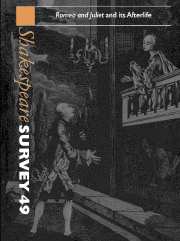Book contents
- Frontmatter
- The Challenges of Romeo and Juliet
- The Date and the Expected Venue of Romeo and Juliet
- The ‘Bad’ Quarto of Romeo and Juliet
- Shakespeare’s Romeo and Juliet: The Places of Invention
- ‘Death-marked love’: Desire and Presence in Romeo and Juliet
- Carnival and Death in Romeo and Juliet: A Bakhtinian Reading
- Ideology and the Feud in Romeo and Juliet
- Bawdy Puns and Lustful Virgins: The Legacy of Juliet’s Desire in Comedies of the Early 1600s
- Picturing Romeo and Juliet
- Nineteenth-Century Juliet
- ‘O, what learning is!’ Pedagogy and the Afterlife of Romeo and Juliet
- The Film Versions of Romeo and Juliet
- The Poetics of Paradox: Shakespeare’s Versus Zeffirelli’s Cultures of Violence
- ‘Lawful deed’: Consummation, Custom, and Law in All’s Well That Ends Well
- ‘Have you not read of some such thing?’ Sex and Sexual Stories in Othello
- French Leave, or Lear and the King of France
- The Actor as Artist: Harold Hobson’s Shakespearian Theatre Criticism
- Shakespeare Performances in England, 1994–1995
- Professional Shakespeare Productions in the British Isles, January-December 1994
- Critical Studies
- Shakespeare’s Life, Times, and Stage
- Editions and Textual Studies
- Books Received
- Index
The Film Versions of Romeo and Juliet
Published online by Cambridge University Press: 28 March 2007
- Frontmatter
- The Challenges of Romeo and Juliet
- The Date and the Expected Venue of Romeo and Juliet
- The ‘Bad’ Quarto of Romeo and Juliet
- Shakespeare’s Romeo and Juliet: The Places of Invention
- ‘Death-marked love’: Desire and Presence in Romeo and Juliet
- Carnival and Death in Romeo and Juliet: A Bakhtinian Reading
- Ideology and the Feud in Romeo and Juliet
- Bawdy Puns and Lustful Virgins: The Legacy of Juliet’s Desire in Comedies of the Early 1600s
- Picturing Romeo and Juliet
- Nineteenth-Century Juliet
- ‘O, what learning is!’ Pedagogy and the Afterlife of Romeo and Juliet
- The Film Versions of Romeo and Juliet
- The Poetics of Paradox: Shakespeare’s Versus Zeffirelli’s Cultures of Violence
- ‘Lawful deed’: Consummation, Custom, and Law in All’s Well That Ends Well
- ‘Have you not read of some such thing?’ Sex and Sexual Stories in Othello
- French Leave, or Lear and the King of France
- The Actor as Artist: Harold Hobson’s Shakespearian Theatre Criticism
- Shakespeare Performances in England, 1994–1995
- Professional Shakespeare Productions in the British Isles, January-December 1994
- Critical Studies
- Shakespeare’s Life, Times, and Stage
- Editions and Textual Studies
- Books Received
- Index
Summary
Many of Shakespeare’s plays have inspired music written subsequently, either as full opera scores or as incidental music to accompany theatre productions. But it is difficult to call to mind a play whose musical associations have become so well known in their own right as Tchaikovsky’s Romeo and Juliet Fantasy Overture, originally written in 1869, or Prokofiev’s ballet score completed in 1936, the year which saw the release of George Cukor’s film. And since film, from its early days, has leaned heavily upon music as a commentary on dramatic action, it is not surprising that snatches of Tchaikovsky’s Romeo and Juliet music have been woven into the sound tracks of George Cukor’s film adaptation of the play as well as other films of the 1930s and 1940s at a clear remove from Shakespeare where love is thwarted by uncontrollable circumstance. Prokofiev’s music has remained more firmly tied to the ballet stage, but its musical and choreographic dramatization has the rare distinction of having twice been filmed for cinema.
In their selected filmography Holderness and McCullough list twenty-three film adaptations of the play, the earliest (1900) made in France by Clement Maurice. Its frequency is bettered only by films of Hamlet, the earliest made, again by Clement Maurice, in 1900. Rothwell and Meltzer in a more comprehensive listing record sixty-one film versions of Romeo and Juliet, including Bernstein's modern musical adaptation of the play into West Side Story.
- Type
- Chapter
- Information
- Shakespeare Survey , pp. 153 - 162Publisher: Cambridge University PressPrint publication year: 1996
- 2
- Cited by

